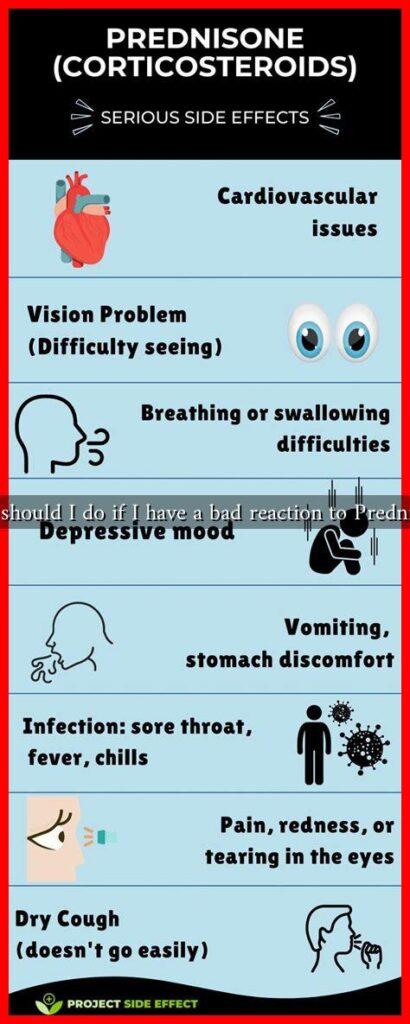-
Table of Contents
What Should I Do If I Have a Bad Reaction to Prednisone?
Prednisone is a corticosteroid medication commonly prescribed to treat a variety of conditions, including autoimmune diseases, allergies, and inflammation. While it can be highly effective, some individuals may experience adverse reactions. Understanding how to manage these reactions is crucial for maintaining health and well-being. This article will guide you through the steps to take if you experience a bad reaction to prednisone.
Understanding Prednisone and Its Side Effects
Prednisone works by suppressing the immune system and reducing inflammation. However, it can also lead to a range of side effects, some of which can be severe. Common side effects include:
- Weight gain
- Increased appetite
- Insomnia
- Mood swings
- High blood sugar levels
- Increased risk of infections
In some cases, individuals may experience more serious reactions, such as:
- Severe allergic reactions (anaphylaxis)
- Gastrointestinal bleeding
- Vision problems (cataracts or glaucoma)
- Bone loss (osteoporosis)
Recognizing a Bad Reaction
It is essential to recognize the signs of a bad reaction to prednisone. Symptoms may vary from person to person, but some indicators include:
- Swelling of the face, lips, or throat
- Difficulty breathing or swallowing
- Severe abdominal pain
- Unexplained bruising or bleeding
- Severe mood changes or depression
If you experience any of these symptoms, it is crucial to take immediate action.
Immediate Steps to Take
If you suspect you are having a bad reaction to prednisone, follow these steps:
- Contact Your Healthcare Provider: Reach out to your doctor or healthcare provider as soon as possible. They can assess your symptoms and determine the best course of action.
- Seek Emergency Care: If you experience severe symptoms such as difficulty breathing, swelling, or severe abdominal pain, seek emergency medical attention immediately.
- Do Not Stop Suddenly: If you have been taking prednisone for an extended period, do not stop taking it abruptly without consulting your doctor. This can lead to withdrawal symptoms and other complications.
Managing Side Effects
In some cases, your healthcare provider may recommend strategies to manage side effects rather than discontinuing the medication entirely. These may include:
- Adjusting the Dosage: Your doctor may lower your dose to minimize side effects while still providing therapeutic benefits.
- Switching Medications: If prednisone is not suitable for you, your doctor may prescribe an alternative medication that may have fewer side effects.
- Implementing Lifestyle Changes: Incorporating a balanced diet, regular exercise, and stress management techniques can help mitigate some side effects.
Long-Term Considerations
Long-term use of prednisone can lead to significant health issues, including osteoporosis and diabetes. Regular monitoring and follow-up appointments with your healthcare provider are essential. Consider the following:
- Bone Health: Discuss bone density testing and potential supplements like calcium and vitamin D with your doctor.
- Regular Blood Sugar Monitoring: If you are at risk for diabetes, regular blood sugar checks may be necessary.
- Psychological Support: If mood swings or depression occur, consider seeking support from a mental health professional.
Conclusion
Experiencing a bad reaction to prednisone can be alarming, but understanding how to respond can help you manage your health effectively. Always communicate openly with your healthcare provider about any side effects you experience. Remember, while prednisone can be a powerful tool in managing various health conditions, it is essential to monitor its effects on your body closely. For more information on managing side effects of medications, you can visit the National Institutes of Health.
In summary, recognizing the signs of a bad reaction, taking immediate action, and working closely with your healthcare provider can help you navigate the challenges associated with prednisone use. Your health is paramount, and proactive management is key to ensuring a positive outcome.

